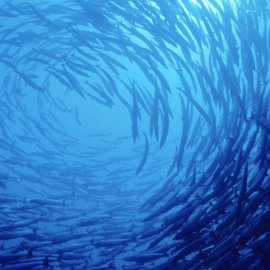World Ocean Assessment, Part 2
-
English
-
ListenPause
I’m Peter Neill, Director of the World Ocean Observatory. World Ocean Radio continues today its exposition of the first UN World Ocean Assessment, a massive baseline study of all aspects of the ocean – what they are, why they matter, their present conditions, negative causes, and positive recommendation for changed policy and action in the future. The Report, like the subject, is vast, and it might be good to have a table of contents, just to remind us of the diverse, integrated ways the ocean affects our lives. Here is a just partial list of ocean issues covered: sea surface temperature, sea level rise, ocean acidification, salinity, stratification, ocean circulation, extreme weather events, ultraviolet radiation and the ozone layer, implications for human well-being and biodiversity, changes in the seasonal life cycles in the ocean, loss of sea ice in high latitude and associated ecosystems, plankton, fish stock distribution, seaweeds and sea grass, shellfish productivity, low-lying coasts, coral reefs, eutrophication problems, overfishing, by-catch discard and waste on non-target fish, marine mammals, and birds, hazardous substances, noise pollution, aquaculture, social issues, food safety, biodiversity patterns and hot-spots, economic activity, submarine cables and pipelines, offshore mining, offshore renewable energy, fishery management areas, marine protected areas, land based inputs, heavy metals, agricultural inputs, radioactive substance, solid waste disposal, marine debris, invasive species, tourism, cultural and religious beliefs, integrated management, ecosystems services, among many, many, many others. As we consider each of these, we realize that every one requires a major effort to research and understand, to measure current impacts and alternative strategies, and to define and recommend responsible actions in the context of certainly increased projections and pressures to come as the world population increases and the productivity on land reaches its limits. It is important to understand that, today, there are thousands of scientists and academics, policy and decision-makers in myriad organizations worldwide that are engaged and dedicated in the accumulation of knowledge and information about the full spectrum of ocean connection between marine systems and human endeavor. These represent, on the one hand, an astonishing resource and commitment to understanding of this pervasive global system; while, on the other hand, they reveal an investigative resource that is limited and at a level of activity that is inadequate to full understanding of the problem and the urgency of solution. How, then, are we expected to proceed? As the Director of the World Ocean Observatory, I have attended many ocean conferences over the years where the most informed and dedicated individuals have gathered to address this challenge. My desk lamp is hung with multiple lanyards and badges from all these events, reminders of the efforts and best intentions these meetings entail. As I listen and learn from the distinguished presenters, I have come to realize that we can no longer postpone individual and collective action behind the assertion that we don’t know enough. The World Ocean Assessment is a huge compendium of what we do know, and behind it lies enormous data, analyses, academic papers, policy reports, plans and recommendations, from so much of this activity that has occurred before. As such, still, this Assessment has no purpose other than to inform us of best knowledge and theoretical practice. As a baseline it is enormously useful, but as a structure or commitment to a plan of action it is mostly useless. I submit that we owe its authors, however, and all the individuals behind them, our engagement in maximizing its utility. For every one of those ocean issues mentioned today, there exists an organization or advocacy group; for every one, there is available science, technology, and even policy that pertains and represents responsible action and incremental change. Let’s declare that this baseline report demonstrates that we know enough, that we have to tools and actions that can make an immediate difference, that the choice is ours to share our commitment by acting with and within these groups as part of what the Blue Frontier Campaign call “the seaweed revolution.” It’s time. We will discuss these issues, and more, in future issues of World Ocean Radio. World Ocean Radio is produced by the World Ocean Observatory in association with WERU FM, Blue Hill, Maine. Find our podcast on iTunes and at World Ocean Observatory dot org.
In this second of four episodes dedicated to outlining the complexities contained in the United Nations World Ocean Assessment, host Peter Neill explores a partial list of the ocean issues contained in the Report, and argues that this baseline document demonstrates that we know enough about ocean issues and that we have the tools and actions at our disposal to make an immediate commitment and difference in the ocean future.
About World Ocean Radio
Peter Neill, Director of the World Ocean Observatory and host of World Ocean Radio, provides coverage of a broad spectrum of ocean issues from science and education to advocacy and exemplary projects. World Ocean Radio, a project of the World Ocean Observatory, is a weekly series of five-minute audio essays available for syndicated use at no cost by college and community radio stations worldwide. A selection of episodes is now available in Portuguese, Spanish, French, Swahili, and Mandarin, enabling us to reach 75% of the world's population. For more information, visit WorldOceanObservatory.org/world-ocean-radio-global.
Resource from this Episode
< "The First Global Integrated Marine Assessment:
World Ocean Assessment 1" | UN.org
- Login to post comments



